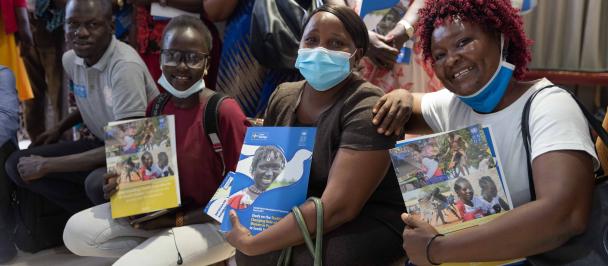Urgent action needed to address South Sudan’s forgotten crisis, says UNDP Crisis Chief
February 6, 2024

Dominic Sam UNDP RR.ai and Shoko Noda, Director Crisis Bureau - UNDP visit refugee and returnee transit centre in Malakal
South Sudan is facing an escalating crisis marked by conflict, climate change, displacement, and soaring living costs, pushing millions of its people to the brink. Urgent intervention is imperative to alleviate suffering and chart a path towards a more prosperous future, said UNDP’s Crisis Chief from Juba today.
Recent projections reveal alarming statistics, with approximately 7.1 million out of South Sudan's 12.4 million population expected to endure crisis-level hunger during the upcoming lean season, starting in a month. Moreover, nine million individuals require humanitarian assistance this year, half of whom are children. Shockingly, less than one in ten have access to electricity, while 70 percent lack basic healthcare services.
United Nations Assistant Secretary-General and United Nations Development Programme Crisis Bureau Director, Shoko Noda, visited South Sudan this week, bearing witness to the country’s deepening crisis. In Malakal, where hundreds of thousands have sought refuge since the outbreak of conflict in Sudan last April, ASG Noda observed firsthand how the large-scale displacement is exacerbating existing challenges in the country.
"As the world's attention is drawn elsewhere, the people of South Sudan are enduring unimaginable hardship, grappling with ongoing conflict, mass displacement, the ravages of climate change, and an exorbitant cost of living that renders basic necessities unattainable for many. The impact is devastating," remarked ASG Noda. "South Sudan urgently requires increased development support that empowers individuals to break free from the cycle of crisis and build safer, more stable, and prosperous lives."
During her visit, ASG Noda engaged with senior officials, including Vice President of the Gender and Youth Cluster, Rebecca Nyandeng De Mabior, Minister of Humanitarian Affairs and Disaster Management, Albino Akol Atak Mayom, United Nations Special Representative of the Secretary-General to South Sudan, Nicholas Haysom, alongside key UN partners and donors.
ASG Noda reaffirmed UNDP’s commitment to work with the Government of South Sudan and partners to provide critical development support.
UNDP is working in all South Sudanese states, and at the national level, to strengthen the institutions responsible for building a safer, more peaceful and prosperous society.
To respond to the deepening displacement crisis, UNDP has supported the creation of the National Coordination and Operations Centre, which will coordinate emergency, humanitarian and ‘durable solutions’ response; as well as the Relief and Rehabilitation Commission (RRC), to strengthen their ability to respond to the rapid population rise due to the Sudan conflict and deliver essential services to those in need.
At the local level, UNDP is working with local authorities to provide the essential foundations for building resilience. This includes strengthening access to justice, essential service delivery, and peacebuilding.
In Malakal, ASG Noda visited activities focused on strengthening youth engagement and empowerment. Young people she met spoke to how such activities were creating a sense of hope, while helping overcome tensions within the community and address trauma.
Interventions such as these are critical in addressing the underlying triggers for inter-communal violence and laying the foundation for more resilient communities.
END
About UNDP in South Sudan:
For more information, or to arrange an interview with United Nations Development Programme Assistant Secretary-General and Crisis Bureau Director Shoko Noda please contact:
Amos Agiro, UNDP South Sudan Communications Specialist, Juba, amos.agiro@undp.org
Aimee Brown, UNDP Crisis Bureau Communications Specialist, New York, Aimee.brown@undp.org
Ngele Ali, UNDP Africa Regional Communications Advisor, Nairobi, Ngele.ali@undp.org

 Locations
Locations





